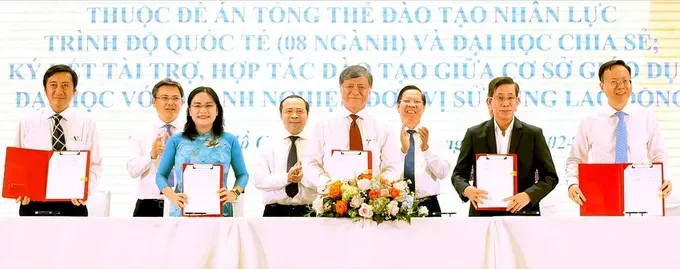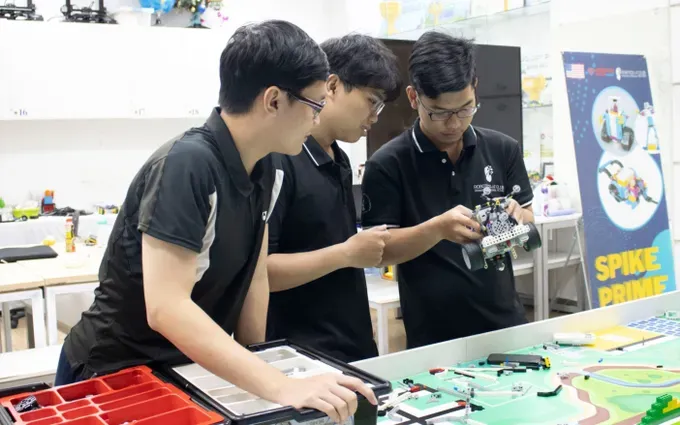
According to Assoc Prof Dr Tran Cao Vinh, Vice President of Vietnam National University-HCMC (VNU-HCM), the city’s urgent demand for high-quality human resources has spurred the university to take a proactive role. VNU-HCMC has spearheaded plans and programs directly tethered to the city’s evolving needs, forging a deep and meaningful collaboration.
This partnership rests on a three-pronged approach: strengthening the linkage between the state, academia, and enterprise; developing bespoke training programs “ordered” by the city; and organizing practical, application-oriented research.
This synergy is formalized in an agreement between VNU-HCM and the HCMC People’s Committee, outlining 43 major joint tasks spanning everything from human resource development and scientific research to digital transformation and infrastructure. Notably, the university is a key player in the city-commissioned project to establish HCMC as a national and regional center for high-quality human resource training.
The project’s outcomes are expected to be instrumental in shaping strategic workforce solutions for the city. In a powerful vote of confidence, the city recently invested VND85 billion (US$3.3 million) in VNU-HCM’s advanced materials research group, a clear signal of the reciprocal trust between the government and the university.
Furthermore, since the beginning of 2025, universities across HCMC have launched international-level training programs in eight critical fields of ICT, Mechanical Engineering & Automation, AI, Business Administration, Finance & Banking, Health, Tourism, and Urban Management. These specialized programs were specifically “ordered” by the city to cultivate a world-class labor force, thereby sharpening HCMC’s competitive edge and fueling its economic growth.
With the goal of elevating its training and research to a new plane, VNU-HCM is intensifying its comprehensive partnership with the city, directly aligning its efforts with the demands of the knowledge economy.
The university has rolled out a series of key initiatives focused on training high-quality human resources and nurturing talent in basic sciences, interdisciplinary studies, and strategic technologies. Each year, VNU-HCM supplies a pipeline of approximately 15,000 highly skilled graduates to the city in crucial sectors such as AI, Big Data, IoT, Semiconductor Technology, New Materials, Biotechnology, Automation, and the Digital Economy.

In collaboration with the city, VNU-HCMC has also established the National Innovation Center, creating a vital link to the region and the world. A new Regional Innovation Center is slated to open in early 2026, further connecting HCMC with the dynamic Southeast innovation corridor.
This strategic focus aims for tangible results of boosting the city’s international publications by 10 percent annually, increasing patents by 18 percent per year, and establishing at least three regionally or globally ranked science and technology organizations. The ultimate vision is to build the VNU-HCM campus into the nation’s very first smart university urban area.
A paradigmatic example of this new model is the “commissioned” AI training program at the University of Science. Built on the world’s leading educational frameworks, the program is designed to produce an internationally qualified workforce, proficient in English and equipped with the skills for global integration.
Following VNU-HCM’s lead, many other universities are now developing their own city-commissioned programs in fields like ICT, finance-banking, and automation. These curricula are designed to international standards, blending theory with practice and placing a strong emphasis on foreign language proficiency, ensuring graduates are ready for the global job market.
On the existing foundations, the Master Plan for Training International-Level Human Resources (2020-2035) and the Shared University (approved by the HCMC People’s Committee on July 5, 2021, according to Action Program No. 02-CTrHD/TU of the HCMC Party Committee) have become a strategic orientation framework for schools to continue to expand and raise the goal of training high-quality human resources.
The project aims to train university and postgraduate level human resources with international qualifications for 8 fields, thereby contributing to the development of a high-quality labor force, helping to create a competitive advantage and economic growth for HCMC in particular and for Vietnam in general in the process of integrating into the global value chain, meeting the comprehensive innovation of education and the trend of labor force globalization.
President Ngo Thi Phuong Lan of the University of Social Sciences and Humanities (VNU-HCM) shared that universities across HCMC remain steadfast partners with the city, especially in the mission to become a national education leader and elevate the human resources.
Her university is focused on high-quality training and research in the social sciences, and it’s committed to building a sustainably developing “Green University.” It will also strengthen its role in attracting top talent and providing insightful policy consultation, while continuing to act as a cultural bridge, promoting the Vietnamese language and culture to the world with the city’s sactive support.
Vice President Thai Doan Thanh of the HCMC University of Industry and Trade commented that as HCMC transforms into a leading smart “super-metropolis,” her university is proud to play an integral role in this journey. With a mission centered on training, applied research, and technology transfer, it’s not just meeting socio-economic needs but also affirming its place in this new era of innovation.
It’s committed to accompanying the city in building a vibrant innovation ecosystem until 2030 with a vision to 2045, having forged strategic partnerships with city departments to support projects in digital transformation and smart city development. These efforts help position HCMC as a magnet for international investment and talent.
























